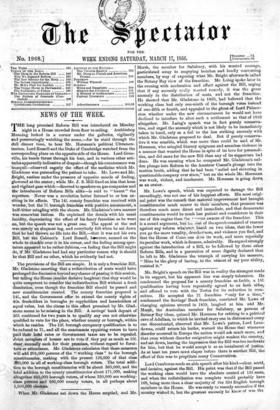When Mr. Gladstone sat down the House emptied, and Mr.
Marsh, the member for Salisbury, with his wonted courage, gesticulated away to emptying benches and loudly conversing members, by way of exposing what Mr. Bright afterwards called the Botany Bay view of the franchise. Mr. Laing spoke later in the evening with moderation and effect against the Bill, urging that if any anomaly really wanted milady, it was the gross anomaly in the distribution of seats, and not the franchise. He showed that Mr. Gladstone in 1860, had believed that the working class had only one-ninth of the borough votes instead of one-fifth or fourth, and appealed to the ghost of Lord Palmer- ston whether under the new circumstances he would not have declined to interfere to alter such a settlement as that of 1832 altogether. Mr. Laing's speech was in fact purely conserva- tive, and urged the anomaly which is not likely to be immediately taken in hand, only as a foil to the less striking anomaly with which Mr. Gladstone proposed to deal. But if purely conserva- tive it was sensible, which was more than could be said of Mr. Horsman, who mingled literary epigrams and senseless violence in a manner that wearied the House in spite of its love for personali- ties, and did more for the new Bill than any of its supporters had done. He was amusing when he compared Mr. Gladstone's sud- den plunge into Reform to the Amateur Casual's plunge into the mutton broth, adding that he had been " soiled and shivering in questionable company ever since," but on the whole Mr. Horsman was weak, violent, and incoherent. Mr. Horsman is going down as an orator.






























